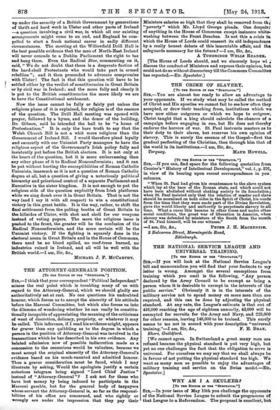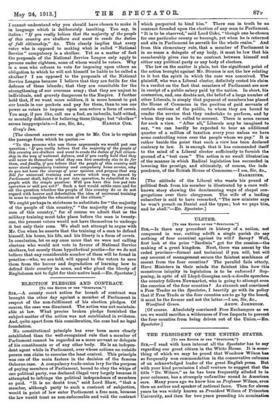WHY AM I A SKULKER?
[To THE EDITOR OP THE " SFECTATOR."] SIR,—In your issue of May 10th you challenge the opponents of the National Service League to submit the programme of that League to a Referendum. The proposal is excellent, but
I cannot understand why you should have chosen to make it in language which is deliberately insulting. You say, in italics : "If you really believe that the majority of the people of this country are skulkers and want to evade the duties of full citizenship," &c. This clearly implies that every voter who is opposed to making what is called "National Service " compulsory is a skulker. Yet as a matter of fact the proposals of the National Service League only apply to persons under eighteen, none of whom would be voters. Why is a man who refuses to vote for imposing upon others an obligation to which he will not himself be liable to be called a skulker ? I am opposed to the proposals of the National Service League because I believe that they are futile for the defence of these islands ; that they are unsuitable for the strengthening of our overseas army ; that they are unjust to individuals, and gravely dangerous to the Empire. I further hold that, if we want more soldiers, it is more honest to put our hands in our pockets and pay for them, than to use our power as voters to impose upon non-voters a form of corvje.
You may, if you like, call me a fool, an imbecile, half-witted, or mentally deficient for believing these things; but "skulker" [The clearest answer we can give to Mr. Cox is to reprint the passage from which he quotes :—
"To the persons who use these arguments we would put one question: 'If you really believe that the majority of the people of this country are skulkers and want to evade the duties of full citizen- ship in the way of national defence, and if you really hold that they will never do themselves what they can hire somebody else to do for them, and finally, if you believe that the people of this country will never stand compulsory training and compulsory home service, why do you not have the courage of your opinion and propose that any Bill for universal training and service which may be passed by Parliament shall, before it is put into operation, be submitted to the people with the simple question: Will you have this law put into operation or will you not ?' Such a test would settle once and for all the question whether the people of this country do or do not regard with horror and detestation the idea of universal training in aims to complete the education of the citizen."
We ought perhaps in strictness to substitute for " the majority of the people of this country," "the majority of the young men of this country," for of course we admit that as the military training must take place before the man is twenty- one, the present voters would not have themselves to undergo it but only their sons. We shall not attempt to argue with Mr. Cox when he asserts that the training of a man to defend himself, his home, his life, and his liberty is a form of corvee.
In conclusion, let us say once more that we were not calling electors who would not vote in favour of National Service skulkers, but merely those hypothetical youths—for we do not believe that any considerable number of them will be found in practice—who, we are told, will appeal to the voters to save them from the horror and degradation of learning how to defend their country in arms, and who plead the liberty of Englishmen not to fight for their native land.—ED. Spectator.]











































 Previous page
Previous page